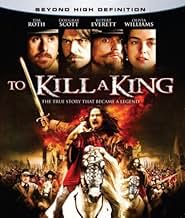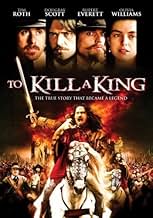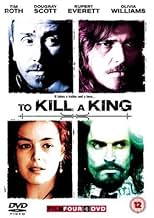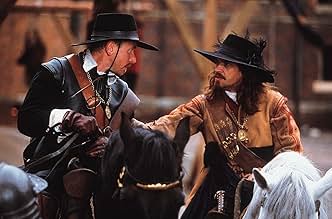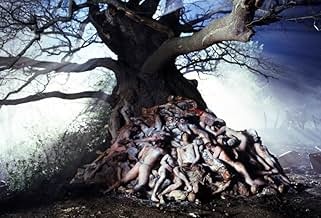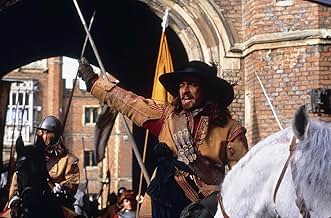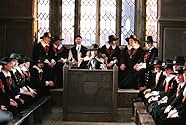IMDb-BEWERTUNG
6,2/10
3528
IHRE BEWERTUNG
Ein Bericht über die Beziehung zwischen General Fairfax und Oliver Cromwell, als sie versuchen, die Folgen der Absetzung von König Karl I. zu bewältigen.Ein Bericht über die Beziehung zwischen General Fairfax und Oliver Cromwell, als sie versuchen, die Folgen der Absetzung von König Karl I. zu bewältigen.Ein Bericht über die Beziehung zwischen General Fairfax und Oliver Cromwell, als sie versuchen, die Folgen der Absetzung von König Karl I. zu bewältigen.
- Nominiert für 1 BAFTA Award
- 3 Nominierungen insgesamt
Empfohlene Bewertungen
I was quite excited to see this being a fan of historical films and particularly interested in the Tudor and Stuart periods. The front of the video is presented in exactly the same style as Elizabeth which I thoroughly enjoyed. Elizabeth is relatively well researched and despite some poetic license depicts the early reign well. So this coupled with the acting prowess of Rupert Everett and Tim Roth all boded well. But what a pile of poopie. Over simplified, dreadfully inaccurate, - the list goes on = one of the most interesting periods of English History turned in to a bad Soap Opera. A significant part of the story is Fairfaxes refusal to sign Charles's death warrant. Well ladies and gentlemen in fact he was one of the first to sign. Suffice it to say the lines at the end "And England never again became a republic" (lol) sums up this little piece of filmery.
The film centers about Olivier Cromwell (Tim Roth) and Thomas Fairfaix (Dougray Scott). This interesting picture results to be a recounting of the relationship between General Fairfax and Oliver Cromwell, as they try to cope with the consequences of deposing King Charles I . As Cromwell took over Parliament and taking on king Charles I (Rupert Everett). Then were created two factions : the Roundheads (Cromwell's congressmen) and Cavaliers or Royalists (King's nobility) , both sides had generals of considerable skill and undaunted courage as Thomas Farfaix . Cromwell defeated royal army in battles of Moor , Preston and Naseby (1645). Later on , in 1653 , he was named Lord protector of "Commomwealth" Republic . He imposed a dictatorship ruled by puritans and vanquished the Irish and Scottish army . He also fights against Holland and Spain . Cromwell developed a law of navigation for the British navy . He early died by fevers's illness . Richard Cromwell succeeded his father as President but he was rapidly dismissed .
A general of the Republic army and professional soldier named Thomas Farfaix commands the troops as Parliamentary commander-in-chief . His misunderstanding with Cromwell originates his desertion . Duration Republic was since 1648 to 1660 . Charles II went back to British kingdom and the regicides (those who had condemned Charles I to death) were arrested and hanged , drawn and quartered at Charing Cross . The Cromwell's body was disinterred , and his remains were hung from a scaffold.
The main cast formed by Tim Roth , Dougray Scott , Rupert Everett and Olivia Williams as Lady Farfaix give excellent performances in this historic tale . The movie is very atmospheric with a first rate set design and splendid scenarios . Good direction by Mike Barber , colorful cinematography and evocative musical score . The motion picture will appeal to history's buffs. Rating : 6,5 / 10 . Better than average .
A general of the Republic army and professional soldier named Thomas Farfaix commands the troops as Parliamentary commander-in-chief . His misunderstanding with Cromwell originates his desertion . Duration Republic was since 1648 to 1660 . Charles II went back to British kingdom and the regicides (those who had condemned Charles I to death) were arrested and hanged , drawn and quartered at Charing Cross . The Cromwell's body was disinterred , and his remains were hung from a scaffold.
The main cast formed by Tim Roth , Dougray Scott , Rupert Everett and Olivia Williams as Lady Farfaix give excellent performances in this historic tale . The movie is very atmospheric with a first rate set design and splendid scenarios . Good direction by Mike Barber , colorful cinematography and evocative musical score . The motion picture will appeal to history's buffs. Rating : 6,5 / 10 . Better than average .
To Kill a King is directed by Mike Barker and written by Jenny Mayhew. It stars Tim Roth, Dougray Scott, Olivia Williams, James Bolam and Rupert Everett. Music is by Richard G Mitchell and cinematography by Eigil Bryld.
It's the end of the English Civil War and with King Charles 1st (Everett) held prisoner by the Parliamentarians, Sir Thomas Fairfax (Scott) and Oliver Cromwell (Roth), friends and colleagues, fall out over the best plan of action for the New England.
A severely troubled production and budgetary constraints left To Kill a King with a mountain to climb just to get acknowledged as a historical epic of worth. Add in the dubious take on this part of English history that so irked the historians, and you would be forgiven for thinking that the film is something of a stinker. Not so actually. For although it's clearly far from flawless, it's a literary piece of work that chooses character dynamics over blood and thunder. Suffice to say that those searching for a battle strewn epic should look elsewhere, but if you have a bent for observations on key personalities involved in war politics during times of upheaval in a period setting? Then this delivers the goods. Well performed by the principal players as well. 7/10
It's the end of the English Civil War and with King Charles 1st (Everett) held prisoner by the Parliamentarians, Sir Thomas Fairfax (Scott) and Oliver Cromwell (Roth), friends and colleagues, fall out over the best plan of action for the New England.
A severely troubled production and budgetary constraints left To Kill a King with a mountain to climb just to get acknowledged as a historical epic of worth. Add in the dubious take on this part of English history that so irked the historians, and you would be forgiven for thinking that the film is something of a stinker. Not so actually. For although it's clearly far from flawless, it's a literary piece of work that chooses character dynamics over blood and thunder. Suffice to say that those searching for a battle strewn epic should look elsewhere, but if you have a bent for observations on key personalities involved in war politics during times of upheaval in a period setting? Then this delivers the goods. Well performed by the principal players as well. 7/10
My reaction to this movie was similar to my reaction to "Elizabeth: The Golden Age." A lot of attention was paid to casting and period costuming and location. However, budget constrictions apparently were such that the story could not be told on a greater scale. For example, the movie begins with the mopping up after Cromwell's army has defeated the royalist forces. But unless you are well versed in English history, you don't know why or how they were fighting. (Like the Roman Legions, Cromwell's--or Fairfax's--army had a distinct organizational, tactical and weapon advantage over their opponents.) Gradually the differences in philosophy of governing is portrayed and we begin to get some idea of why everyone hated Charles I, although we really don't see much from a commoner's perspective. The reason for the close relationship of Lady Fairfax to the King and to Cromwell is never made clear (at least not to me). If you have to tell this story with limited locations, then it's better done as a mini-series, where the historical reasons for the conflict can better be elaborated. If you're going to make a movie, at least show us some battle scenes and better explain the motives for everyone's actions.
It's amazing that, three decades after Antonia Fraser's great biography of Cromwell ("Cromwell: Our Chief of Men", 1973; out in a new edition, 2002), the old clichés and inaccuracies about him - ultimately derived from the post-Restoration character assassination satirized in "1066 and All That" - are still being as enthusiastically retailed as they are in this film.
That the dominant image of Cromwell is going to be of Ollie the psychopath is telegraphed in advance by the casting of Tim Roth to play him. Why people think this man can act has always been a mystery to me, but ever since "Reservoir Dogs" he has become so identified with the image of a psychopath that his mere presence is a sign that irrational violence is coming up soon. Right at the beginning of the film we are smacked over the head with this characterization when, before we have heard Cromwell speak a word, we see him barely being restrained from murdering a defenceless man. Later he organizes the torture and then murder of a prisoner, randomly shoots a street vendor in the leg, and ordains a painful execution for a would-be assassin in a fit of uncontrolled rage.
On the other hand, he loves his old mate Fairfax, spends hours writing up a proper constitutional settlement to give ordinary people the right to a fair trial, and shows an almost Woody-Allenesque unconfidence in his abilities as a military commander (comically, since even his enemies conceded his military genius). All these positive character traits are presumably thrown into the mix in order to give the semblance of roundedness, depth, or complexity to the characterization. The trouble is that the combination makes this Cromwell not complex, but simply incoherent. One cannot suspend disbelief in him. That's why, in this case, to say "it's a movie, not history" is not an answer to the criticism. It's precisely because it doesn't make sense as history that it doesn't work as a movie either.
The film is also notable for perpetuating the great Royalist lie that Charles I's death warrant was signed by the regicides before the verdict had been announced - indeed, before the trial had even begun. The document was certainly drawn up in advance (the defendant's guilt being as much a matter of public record as Goering's at Nuremberg), but there is no evidence that it was *signed* beforehand; on such a serious matter it's extremely unlikely the regicides would have opened themselves to the accusation of not observing the proper legal process (see the excellent page about the death warrant that I give the address for in the message boards). From the point of view of film-making, though, the most striking thing is how it totally squandered the dramatic opportunity of the trial itself - which took three days, incidentally, not, as it's presented here, three minutes, with people shouting "guilty" before any evidence has even been presented. As an opportunity to probe Charles's psychology, as he was presented with evidence of the damage his actions had caused, it was completely wasted.
Rupert Everett plays Charles brilliantly, and in the context of a better film it's a performance that would surely have drawn more of the plaudits that it deserves. His mixture of regal dignity, seductiveness, arrogance, and overweening self-belief make a compelling portrait (being true to life, these contradictions, unlike those assigned to Cromwell, actually make a coherent whole). Throughout all his conversations with his captors, his fundamental inability to accord their grievances the slightest legitimacy clearly illustrates how frustrating and ultimately fruitless the attempt to negotiate with him must have been, and why the conflict could only end with his death. Dougray Scott also brings gravitas and pathos to his role of Fairfax, and he sustains the tension of his conflicting loyalties well - even if that tension is historically bogus. As actors, he and Everett deserve to have been in a better film.
While Americans work the comparatively narrow seam of their history so intensively, it's a great shame that the Brits don't make more of some of the incomparably dramatic moments in their own. An even greater shame that, when they occasionally get the chance, it's fluffed with a script of such silliness and banality as this.
That the dominant image of Cromwell is going to be of Ollie the psychopath is telegraphed in advance by the casting of Tim Roth to play him. Why people think this man can act has always been a mystery to me, but ever since "Reservoir Dogs" he has become so identified with the image of a psychopath that his mere presence is a sign that irrational violence is coming up soon. Right at the beginning of the film we are smacked over the head with this characterization when, before we have heard Cromwell speak a word, we see him barely being restrained from murdering a defenceless man. Later he organizes the torture and then murder of a prisoner, randomly shoots a street vendor in the leg, and ordains a painful execution for a would-be assassin in a fit of uncontrolled rage.
On the other hand, he loves his old mate Fairfax, spends hours writing up a proper constitutional settlement to give ordinary people the right to a fair trial, and shows an almost Woody-Allenesque unconfidence in his abilities as a military commander (comically, since even his enemies conceded his military genius). All these positive character traits are presumably thrown into the mix in order to give the semblance of roundedness, depth, or complexity to the characterization. The trouble is that the combination makes this Cromwell not complex, but simply incoherent. One cannot suspend disbelief in him. That's why, in this case, to say "it's a movie, not history" is not an answer to the criticism. It's precisely because it doesn't make sense as history that it doesn't work as a movie either.
The film is also notable for perpetuating the great Royalist lie that Charles I's death warrant was signed by the regicides before the verdict had been announced - indeed, before the trial had even begun. The document was certainly drawn up in advance (the defendant's guilt being as much a matter of public record as Goering's at Nuremberg), but there is no evidence that it was *signed* beforehand; on such a serious matter it's extremely unlikely the regicides would have opened themselves to the accusation of not observing the proper legal process (see the excellent page about the death warrant that I give the address for in the message boards). From the point of view of film-making, though, the most striking thing is how it totally squandered the dramatic opportunity of the trial itself - which took three days, incidentally, not, as it's presented here, three minutes, with people shouting "guilty" before any evidence has even been presented. As an opportunity to probe Charles's psychology, as he was presented with evidence of the damage his actions had caused, it was completely wasted.
Rupert Everett plays Charles brilliantly, and in the context of a better film it's a performance that would surely have drawn more of the plaudits that it deserves. His mixture of regal dignity, seductiveness, arrogance, and overweening self-belief make a compelling portrait (being true to life, these contradictions, unlike those assigned to Cromwell, actually make a coherent whole). Throughout all his conversations with his captors, his fundamental inability to accord their grievances the slightest legitimacy clearly illustrates how frustrating and ultimately fruitless the attempt to negotiate with him must have been, and why the conflict could only end with his death. Dougray Scott also brings gravitas and pathos to his role of Fairfax, and he sustains the tension of his conflicting loyalties well - even if that tension is historically bogus. As actors, he and Everett deserve to have been in a better film.
While Americans work the comparatively narrow seam of their history so intensively, it's a great shame that the Brits don't make more of some of the incomparably dramatic moments in their own. An even greater shame that, when they occasionally get the chance, it's fluffed with a script of such silliness and banality as this.
Wusstest du schon
- WissenswertesThe films turbulent production was constantly beset with financial problems & funding went bankrupt twice during filming. the film was only barely completed & eventually released through private investment.
- PatzerIn the opening sequence, Fairfax shoots the sword out of the hand of Cromwell's assassin with a flintlock pistol at about 30 yards range. Such pistols had no rifling at that period and were incapable of nowhere near such accuracy, even in the hands of an expert. To shoot at that range Fairfax would have been more likely to have hit the assassin. Also the bullet struck sparks from the sword hilt when it hit. This is impossible as the bullet would have been a soft lead ball and incapable of creating a spark.
- Zitate
Denzil Holles: At last we all can sleep soundly, knowing that for once the King cannot impose a new tax on us in the morning.
Sir Thomas Fairfax: You make it sound as if you fought the war only to save your profits, Holles!
Top-Auswahl
Melde dich zum Bewerten an und greife auf die Watchlist für personalisierte Empfehlungen zu.
- How long is To Kill a King?Powered by Alexa
Details
- Erscheinungsdatum
- Herkunftsländer
- Sprache
- Auch bekannt als
- Cromwell & Fairfax
- Drehorte
- Produktionsfirmen
- Weitere beteiligte Unternehmen bei IMDbPro anzeigen
Box Office
- Budget
- 14.300.000 $ (geschätzt)
- Weltweiter Bruttoertrag
- 567.471 $
- Laufzeit
- 1 Std. 42 Min.(102 min)
- Farbe
- Sound-Mix
- Seitenverhältnis
- 2.35 : 1
Zu dieser Seite beitragen
Bearbeitung vorschlagen oder fehlenden Inhalt hinzufügen


